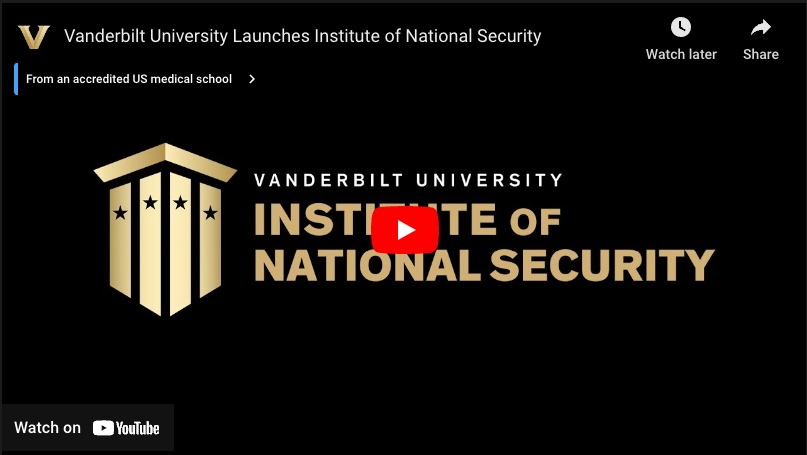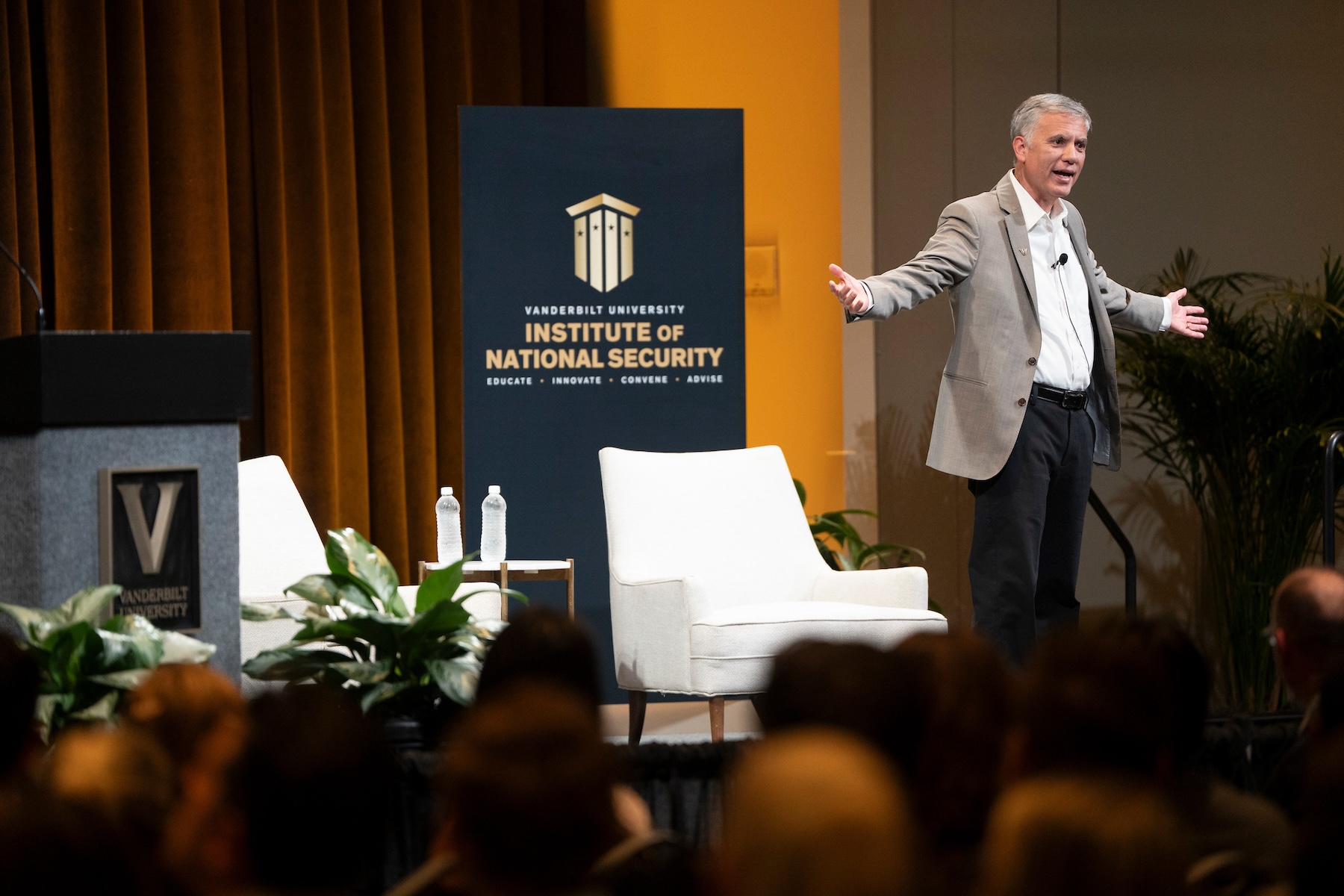 The rise of China. Cybersecurity threats. Climate change and fentanyl poisoning. These are just some of the issues national security leaders said led to the creation of the Vanderbilt Institute of National Security, which officially launched at an event held on campus Sept. 18, 2024.
The rise of China. Cybersecurity threats. Climate change and fentanyl poisoning. These are just some of the issues national security leaders said led to the creation of the Vanderbilt Institute of National Security, which officially launched at an event held on campus Sept. 18, 2024.
The Institute—part of the university’s renowned School of Engineering—seeks to help the policy makers, military leaders and intelligence specialists tackle these problems and develop the next generation of national security leaders. By bridging academia and practice, the Institute aims to address the challenges through innovative research, educational programming and strategic partnerships.
Vanderbilt Chancellor Daniel Diermeier welcomed students, faculty members and distinguished guests at the launch event and said a rapidly evolving national security landscape requires a new spirit of radical collaboration.
“We need military officers who understand cyberspace, and engineers who understand national security,” Diermeier told attendees. “We need interdisciplinary approaches that bring together diverse lenses of history, law, computer science, and engineering. That’s precisely what we do at Vanderbilt. And I am very pleased that this university is taking a big step forward, through the establishment of the Institute of National Security.”

The institute is led by Retired General Paul M. Nakasone, former commander of U.S. Cyber Command and director of the National Security Agency. Nakasone is also Distinguished Research Professor of Engineering Science and Management at the Vanderbilt School of Engineering and is a special advisor on national security to the chancellor.
“I came to Vanderbilt to develop the next generation of leaders and leadership for national security, to help solve some of the ‘wicked problems’ facing our nation, and to be part of this world-class university,” Nakasone said. “Vanderbilt’s renowned faculty, its approach to partnerships, its history of educational collaboration, and most importantly, its students, serve as the foundation of our Institute and for our future success.”
Last year, Nakasone, who was NSA director at the time, was among U.S. intelligence leaders who testified before the U.S. Senate Intelligence Committee at an annual hearing on worldwide threats. He told lawmakers that China remained the “most consequential threat” to U.S. national security.
In a fireside chat with Nakasone at the institute’s launch, Retired Admiral Michael M. Gilday, 32nd Chief of Naval Operations, echoed that sentiment and said the institute can play a role in how resources are handled to focus on China.
“China is our greatest threat as a peer competitor. That has to remain our number one priority,” said Gilday, who is now CEO of Crossover Solutions National Security USA Inc. “Organizations like the institute will help us think about those priorities and perhaps keep us honest in terms of where we put those resources, what amount, and for how long.”
In a discussion moderated by Morgan Ortagus, former spokesperson for the U.S. Department of State, both Nakasone and Gilday said developing critical thinking skills is a key goal of the Institute and imperative for the next generation of national security leaders to be successful.
“If you have incredible critical thinkers, it doesn’t matter who your adversary is,” Nakasone said. “It’s the ability to look at the problem and say this is how I define the problem, the facts, the assumptions, this is what I’m going to apply to it in terms of a series of options, and then choosing that option and being able to measure it. This is what Vanderbilt has done for many, many years. This is what our institute will do.”
Also at the launch event were Cybele Raver, Vanderbilt provost and vice chancellor for academic affairs, and Krishnendu Roy, Bruce and Bridgitt Evans Dean of the School of Engineering and University Distinguished Professor. Both were recognized for helping to bring the institute to fruition.
“The Vanderbilt Institute of National Security embodies our university’s dedication to addressing complex global challenges,” Raver said. “Through interdisciplinary collaboration and the development of the next generation of national security leaders, Vanderbilt is poised to make a significant impact on the future of our nation’s security.”
Roy said that radical collaboration—a collaborative, multidisciplinary approach across disciplines that are not necessarily adjacent—is an integral part of Vanderbilt’s culture.
“Vanderbilt has deep expertise in critical areas of national security, including not just defense and warfighter technologies, but also energy, food, water, human health, climate and, importantly, artificial intelligence—all of which are integral parts of a comprehensive National Security strategy,” he said. “We can solve very complex systems-level problems much faster through collaboration. The multidisciplinary approach ensures that our solutions have lasting value for national security and society as a whole.”
The Institute’s Executive Director Doug Adams, who is also the Daniel F. Flowers Distinguished Professor of Mechanical Engineering, said he hopes people will be energized and excited about the opportunities that the Institute brings to the university.
“With the new generation of challenges, we’ve got to have a new generation of innovators, and I think Vanderbilt is the perfect place to achieve that because we’ve got people who want to collaborate, and they want to work on something that makes a difference in the world,” Adams said.
Cameron Johnson, a first-year student majoring in mechanical engineering at Vanderbilt, said he’s excited about the potential impact of the new Institute.
“This is great,” said Johnson, who is in the university’s Naval ROTC program. “As cyber warfare and other threats increase, it’s extremely important to have future leaders who can address those issues. I’m so glad we have the institute.”
Students, faculty, government agencies, academic institutions and companies interested in working with the Institute of National Security can explore its website or sign up to receive news and updates.